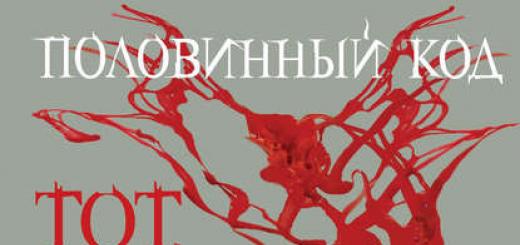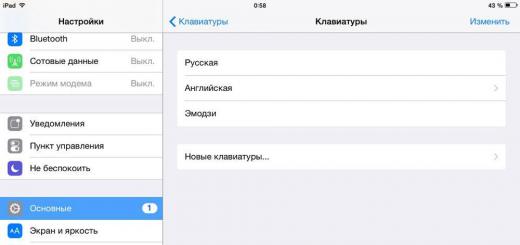The Russian alphabet is a completely unique phenomenon among all known methods of letter writing. It has acrophony (imagery).
Such figurativeness of Russian writing is inherited from the runes with which our ancestors reflected the reality around them. A striking example and indisputable proof of this is the ancient Slovenian initial letter.

Its reduction was carried out more than once, starting with Cyril and Methodius ...


... and up to the October Revolution, when the Bolshevik government forcibly changed the Russian alphabet to the phonetic alphabet.

And such an alphabet is not capable of providing even a simple superficial reading of images. Now it becomes clear why the expression "primary truths" today is not widely known even in the form of an abstract poetic metaphor...
 A story in which all words begin with "P"
A story in which all words begin with "P"
Four linguists met at one of the symposiums: an Englishman, a German, an Italian and a Russian. We were talking about languages. They began to argue, and whose language is more beautiful, better, richer, and what language does the future belong to?
The Englishman said: “England is a country of great conquerors, seafarers and travelers who spread the glory of her language to all corners of the whole world. English - the language of Shakespeare, Dickens, Byron - is undoubtedly the best language in the world."
“Nothing of the kind,” said the German, “Our language is the language of science and physics, medicine and technology. The language of Kant and Hegel, the language in which the best work of world poetry is written - Goethe's Faust.
“You are both wrong,” the Italian entered into an argument, “Think, the whole world, all of humanity loves music, songs, romances, operas! In what language do the best love romances and brilliant operas sound? In the language of sunny Italy!
The Russian was silent for a long time, listened modestly, and finally said: “Of course, I could also, like each of you, say that the Russian language - the language of Pushkin, Tolstoy, Turgenev, Chekhov - surpasses all the languages of the world. But I won't follow your path. Tell me, could you compose a short story in your own languages with a plot, with a consistent development of the plot, so that all the words of the story begin with the same letter?
This puzzled the interlocutors very much and all three said: "No, in our languages it is impossible." Then the Russian answers: “But in our language it is quite possible, and I will prove it to you now. Name any letter. The German replied: “It doesn't matter. The letter "P" for example.
"Fine, here's a story for you with this letter," replied the Russian.
Pyotr Petrovich Petukhov, Lieutenant of the 55th Podolsky Infantry Regiment, received a letter in the mail full of good wishes. “Come,” wrote the charming Polina Pavlovna Perepelkina, “we’ll talk, dream, dance, take a walk, visit a half-forgotten, half-overgrown pond, go fishing. Come, Pyotr Petrovich, to stay as soon as possible.
Petukhov liked the offer. Figured: I'll come. He grabbed a half-worn field cloak, thought: it will come in handy.
The train arrived in the afternoon. Pyotr Petrovich was received by Polina Pavlovna's most venerable father, Pavel Panteleimonovich. “Please, Pyotr Petrovich, sit down more comfortably,” said dad. A bald nephew came up and introduced himself: “Porfiry Platonovich Polikarpov. Please, please."
The lovely Polina appeared. Full shoulders were covered with a transparent Persian scarf. We talked, joked, invited to dine. They served dumplings, pilaf, pickles, liver, pate, pies, cake, half a liter of orange juice. We had a hearty meal. Pyotr Petrovich felt a pleasant satiety.
After eating, after a hearty snack, Polina Pavlovna invited Pyotr Petrovich to take a walk in the park. In front of the park stretched a half-forgotten, half-grown pond. Ride under sail. After swimming in the pond, we went for a walk in the park.
"Let's sit down," suggested Polina Pavlovna. Sit down. Polina Pavlovna moved closer. We sat down, were silent. There was a first kiss. Pyotr Petrovich got tired, offered to lie down, spread out a half-worn field cloak, thought: it came in handy. Lie down, lie down, fall in love. “Pyotr Petrovich is a prankster, a scoundrel,” Polina Pavlovna habitually said.
“Let's get married, let's get married!” whispered the bald nephew. “Let's get married, let's get married,” boomed the approaching dad. Pyotr Petrovich turned pale, staggered, then ran away. Having run, I thought: “Polina Petrovna is a wonderful party, it’s enough to take a steam bath.”
The prospect of obtaining a beautiful estate flashed before Pyotr Petrovich. Hastened to send an offer. Polina Pavlovna accepted the offer, and later they got married. Friends came to congratulate, brought gifts. Passing the package, they said: "A beautiful couple."
Interlocutors-linguists, having heard the story, were forced to admit that the Russian language is the best and richest language in the world.
By sewing on a button, you can change your destiny

You just need to thread a needle and thread through the holes so that you get the desired pattern of one of the letters of the runic alphabet. Each rune has its own meaning.
Choose a pattern that will help you get what you most desire at the moment, thread a needle and sew on a button for good luck!


The Russian language is one of the most difficult. And this is connected not only with vocabulary and syntax, but also with its history. Even for us, native speakers, many things in our native language are still unclear and mysterious.
Message
Linguists have repeatedly noted the acrophonic principle of constructing the Old Russian alphabet and even saw in it a hidden “message to the Slavs”. Each of the Cyrillic letters has its own name, and if you read these names in alphabetical order, you get: “Az buki vede. The verb is good. Live green, earth, and, like some people, think of our peace. Rtsy word firmly - uk furt her. Tsy, worm, shta ra yus yati. One of the options for translating this text is as follows: “I know the letters: a letter is a property. Work hard, earthlings, as befits reasonable people - comprehend the universe! Carry the word with conviction: knowledge is a gift from God! Dare, delve into, in order to comprehend the light of existence!
Which language is closer to the Slavic "ancestor"?
Disputes have long been going on between the patriotic inhabitants of the Slavic countries: what language is closer to the original Slavic? Where did the differences between the dialects on the territory of Eastern Russia (i.e., present-day central Russia), Southern (modern Ukraine) and Western (now Belarus) come from?
The fact is that different elements participated in the genesis of the national languages of these countries. In Russia, in addition to the Slavs, lived the Finno-Ugric tribes, the Balts. Nomads from the southern steppes often visited here. The Tatar-Mongol conquerors not only robbed and ruined Russia, but also left behind a lot of linguistic borrowings.
Swedes, Germans, Poles - European neighbors, also enriched the Russian language with new words. The fact that a significant part of present-day Belarus was historically under the rule of Poland, and that Southern Russia was constantly subjected to raids by nomads, could not but be reflected in the local languages. As they say, who do you hang out with?
But don't get too upset. The fact that our language today is so far from its progenitor is not an accident and not the result of a Masonic conspiracy, but the result of the painstaking work of many talented people who created the Russian literary language in the form in which it exists now. If it were not for the reforms inspired by them, we would not have Pushkin's poetry, Tolstoy's prose, Chekhov's dramaturgy. Who created the language we speak today?
First "dismissal of letters"
In the 18th century, Peter I came to power. He began transformations in all spheres of life, and did not ignore the Russian language. But his reforms concern only the external side, they do not penetrate into the very essence of the language: its syntax, vocabulary, grammar.
Peter I simplifies spelling by getting rid of the Greek letters psi, xi and omega. These letters did not designate any sounds in Russian, and their loss did not impoverish the language at all. Peter tried to get rid of a number of letters of the Russian alphabet: "Earth", "Izhitsa", "Firth", and also removed superscripts, but under pressure from the clergy, these letters had to be returned.
The alphabet reform made life easier not only for schoolchildren of the time of Peter the Great (they had to learn fewer letters), but also for printing houses, which no longer had to print extra characters that were not pronounced when reading.
Lomonosov commented on this as follows: “Under Peter the Great, not only boyars and boyars, but also letters, threw off their wide fur coats and dressed up in summer clothes.”
Why was reform needed?
The real reform is being carried out by the writers and poets of the 18th century: Trediakovsky, Lomonosov, Karamzin. They create the Russian literary language and "consolidate success" with their works. Prior to that, the Russian language, due to constant contacts with Western Europe, was in a chaotic state.
Colloquial forms coexisted in it with bookish ones, borrowings from German, French, Latin were used along with Russian counterparts.
Trediakovsky changes the very principle of Russian versification, adopting and adapting the European syllabo-tonic system - based on a regular alternation of stressed and unstressed syllables.
Lomonosov divides all the words of the Russian language into three groups: the first included those rarely used, especially in colloquial speech, but understandable to literate people: “I open”, “I call”. To the second - words common to the Russian and Church Slavonic languages: “hand”, “now”, “I read”. And to the third group, he included words that have no analogues in church books, that is, Russian words, not originally Slavic: “I say”, “stream”, “only”.
Thus, Lomonosov distinguishes three “calms”, each of which was used in certain literary genres: a high calm was suitable for odes and heroic poems, dramatic works were written with a middle calm, prose - in general, all works where you need to depict living speech. Low calm was used in comedies, satire, epigrams.
Finally, Karamzin enriches the Russian language with neologisms, he refuses the Church Slavonic vocabulary, the syntax of the language in his works approaches the “lighter” French. It is to Karamzin that we owe, for example, the appearance of the words "love" or "sidewalk".
Difficult letter "Yo"
Karamzin was one of the ardent "admirers" of the letter "ё", but he was not at all its inventor. In 1783, one of the first meetings of the Academy of Russian Literature took place. Its founder was Ekaterina Dashkova. Together with the most famous writers of her time: Derzhavin and Fonvizin, the princess discussed the project of the Slavic-Russian Dictionary.
For convenience, Ekaterina Romanovna suggested replacing the designation of the sound "io" with one letter "ё". The innovation was approved by the general meeting of the academy, Dashkova's innovative idea was supported by Derzhavin, who began to use "e" in his works. It was he who was the first to use a new letter in correspondence, and also the first to print a surname with an “e”: Potemkin. At the same time, Ivan Dmitriev published the book “And my knick-knacks”, imprinting all the necessary points in it. And, finally, it received wide use after it appeared in Karamzin's poetry collection.
The new letter also had opponents. Minister of Education Alexander Shishkov is said to have furiously flipped through the numerous volumes of his library and with his own hand marked out two dots above the letter. Among the writers, too, there were many conservatives. Marina Tsvetaeva, for example, fundamentally wrote the word “devil” through “o”, and Andrei Bely, for the same reasons, “yellow”.
In printing houses, the letter is also disliked, because because of it you have to spend extra paint. In pre-revolutionary primers, she was exiled to the very end of the alphabet, in the same company as the dying Izhitsa and Fita. And today its place is in the very corner of the keyboard. But not everywhere the letter "ё" is treated with such disdain - in Ulyanovsk, she even erected a monument.
The secret of "Izhitsa"
In the famous decree of Lunacharsky in 1918 on changes in the Russian language, there is no mention of the letter V (“Izhitsa”), which was the last letter in the pre-revolutionary alphabet. By the time of the reform, it was extremely rare, and it could be found mainly only in church texts.
In the civil language, "Izhitsa" was actually used only in the word "miro". In the tacit refusal of the Bolsheviks from the "Izhitsa", many saw a sign: the Soviet government, as it were, refused one of the seven sacraments - chrismation, through which the Orthodox are given the gifts of the Holy Spirit, designed to strengthen him in spiritual life.
It is curious that the undocumented deletion of "izhitsa", the last letter in the alphabet, and the official liquidation of the penultimate - "feet" made the final alphabetic letter - "ya". The intelligentsia saw in this another malicious intent of the new authorities, who deliberately sacrificed two letters in order to end the letter expressing the human personality, individuality.














Website of Sergey Trofimovich Alekseev and his 40 Russian Lessons

Sergei Alekseev's website, where you can read his Russian Lessons, which Alekseev writes today, now, or copy the text on the site, paste it into a text document and then read it on the Book Reader
INSTEAD OF FOREWORD
The only joy of our life, which is given for free, that is, practically without any labor and effort, is the Gift of Speech. For all other, great and small knowledge, you have to pay or get it in sweat, sometimes applying incredible efforts of your mind, feelings and sometimes muscles. And native speech, natural language comes to us in infancy as a true Gift, as if by itself, causing joy and admiration for the knowledge of the world.
Think about it: by the age of two years of his existence in this world, still physically helpless, with a pure, uncluttered consciousness, most importantly, unable to read or write, the child absorbs a huge amount of knowledge. He gets a complete picture of the world, including even subtle matter - the psychology of interpersonal relationships.
If we didn’t whip our faces against the bench and continued to develop with the same success, to master the sciences at least until the period of adolescence, then we would indeed become the image and likeness of God ... And the main source of information for an infant is vision and hearing. This is if you do not believe in astrology, mysticism, metaphysics and other "pseudo-sciences", do not take into account genetic predisposition, fatal predestination and follow the strict rules of the reinforced concrete laws of evolution.
After all, we are taught from school: the world develops from small to large, from simple to complex. It, this world, has the opposite structure and reverse nature, at least the unique abilities of children prove this irrefutably, making us indignantly indignant when our offspring, who mastered his native language in two years, then crams English or French for eleven school years and does not can't memorize.
And so, thanks to sight and hearing in the first place, interconnected with them, smell, touch and an unintelligible sense of intuition, the baby easily reincarnates from a biological being into a person, into a person, that is, acquires a face, an image. When this miracle happens, we begin to worry about its formation, completely unaware of the fact that it has already happened against our will and through the Gift of Speech, the word, the language, which is the main educational tool.
Here for the first time our child loses this Gift in the literal sense. If, before adult intervention, a word had sound, taste, smell, color, and a whole range of associative representations for him, now we are trying to convince the child (and ourselves, by definition) that it, the word, has a root, suffix, and ending. Well, another suggestion or prefix. The concept of “root” somehow still fits in the inexperienced mind, because it is close to the triune nature of things in the world, but suffixes, prefixes, affixes knock the child out of the divine bosom of understanding and sounding Speech once and for all. The word completely loses not only its meaning, but, above all, its magical essence, opened by the children's consciousness and meaningful by the senses.
In the word "rainbow", for example, he saw the solar arc, decomposed into seven colors and intuitively went back to the idea of the spectrum of white light, about its hidden, mysterious floweriness. He was on a direct path to understanding the most complex laws of nature, physics, chemistry, optics of the atmosphere, but we “formed” it, suggesting that “rad” is just unknown what the root of this word means, “ug” is a suffix, something like a building support structure, well, and “a” is the ending, called so because the word ends with that sound. And if you remember all the linguistic terminology, then the word will be pounded, smeared beyond recognition. But now our child has an occupation - to study at school, and then for another five years at the university, in order to gain an understanding of the nature of the rainbow and the dispersion of light ... And you can sleep almost peacefully - until a mature age, the child is busy, attached, easily controlled and morally completely we are dependent. And then what to do with him until the overgrown kid learns and comes to his senses, does not become like our mores and views?
Our, at least, European education, however, like science, fulfills a hidden, but the main goal - to suppress the divine nature in man. M. V. Lomonosov must have understood this very well in his time, when advanced German linguists plast the living flesh of the Russian language, turning it into a faceless, jelly-like gray mass in which true, natural concepts, meanings and meanings could easily be drowned. Otherwise, it was not possible to plant the manufacturability of European thinking. Reliably, cheaply and angrily suppressing the divine essence of nature is possible in only one way - to take away the self-sufficient educational tool given by the gods Speech, turn it into a signal information system of sounds, dissolving the magical essence of the native language, as mercury dissolves gold. The resulting amalgam becomes amorphous, liquid, formless and rootless, and also seems to contain gold, at least we are convinced of this, but its vapors are poisonous and even fatal to handle. It is dangerous to use it as money, especially as jewelry ...
After the scrofulous miners (please do not confuse with allergy sufferers, scrofula and gold miners, cesspool cleaners) collect dusty gold with mercury, the amalgam is poured into an iron can and evaporated over a fire, standing on the leeward side, so as not to be poisoned. Mercury evaporates without residue, and golden star-shaped grains appear at the bottom. To restore the magical essence of the language, and more so to awaken common sense and reason, one should do the same with speech amalgam. The Common Slavic Gift of Speech and the language of the Eastern Slavs in particular (dialects of Great, Lesser and White Russia) has not only unique educational opportunities, but also the ability to collect and store historical and cultural information that cannot be obtained in any other way than to extract from the language treasury . History is written by historians, in fact, what Herodotus and his followers did, and the legend accumulates in the language, as radioactive particles accumulate in a natural gravel filter.
Therefore, the word will certainly pull you into the unknown bygone times, direct you along the untrodden paths of the distant past, or, on the contrary, like a magic crystal, focus a completely different view of the present and even the future. The language was revealed to me about forty years ago, when I plunged into the unknown depths of my native speech, memorized The Tale of Igor's Campaign, and began to read chronicles and ancient Russian writings in the original. After that, the idea arose to create an etymological dictionary. The imbalance of the modern lexicon and the way of our thinking seemed to me blatant, the blindness of linguistic science was frightening, the level of teaching Russian in schools seemed to be agonizing.
Out of youthful delirium, I blamed the internationalism of the Bolsheviks for everything, who put up barriers to the great and mighty, so that we would not become too proud, therefore, everyone, except Russians, was engaged in the etymology of the Russian. But ten years later, the Democrats came, and because everything worsened by an order of magnitude, it became clear that the suppression of the divine nature in man is done deliberately and regardless of the regime. Especially, at the time of accumulation of primary capital, when the newly introduced terminology and fashionable slang are already directly intended to hide the true meaning of the ongoing reforms or to cover up undesirable phenomena. For example, the word “corruption” is persistently introduced into circulation, and we no longer react to it as a criminal act. One term covered several sinister vices at once, corroding society and state foundations: embezzlement, bribery, extortion. And corrupt officials are not so dangerous after all...
Substitution of concepts is a favorite tool of reformers. We still perceive the world through the word and like children, we still believe it, and old Schumacher and his son-in-law Taubert, who were still under Lomonosov, are still alive, manage the Academy of Sciences and are well aware of our national passions and faith in the word. They are eternal and immortal, like the Mikhalkovs, who write the right anthems for all regimes and make the right movies. And yet, at the same time, I will leave the creation of an etymological dictionary to professional linguists. In the end, this is their bread, headache and glory, especially, judging by the letters of readers, interest in the language, in its original essence, is growing as rapidly as they are trying to fool us, replacing concepts. And naturally, more and more linguists appear, young, tenacious, zealous, who are already tired of the stupidity of German linguistics, and having opened their eyes, have greeted the naked academic king. With my Forty Lessons, I will try to lay a conceptual foundation for future compilers of the dictionary, and for a wide range of readers, to magnetize the compass needle indicating the magnetic pole of the Earth ...
Sergei Alekseev.
Slavic alphabet before the 1918 language reform
The Slavic alphabet differs from other alphabets not only in the embodiment of the principle of unambiguous graphic display: one sound - one letter. This alphabet contains:
AZ BUKY VETI VERB GOOD EAT LIVE ON THE EARTH AND WHAT PEOPLE THINK OUR PEOPLE ARE THE WORD SOLIDLY

To begin with, let's remember the phrase: "Every hunter wants to know where the pheasant is sitting." It is known to everyone since childhood and makes it easy to remember the sequence of colors of the rainbow. This is the so-called acrophonic method of memorization.
Each word of the phrase begins with the same letter as the name of the color: each is red, the hunter is orange ...
Before the language reform of 1918, each letter of the alphabet also had its own name.
|||Each letter stood in its place.
The Russian alphabet is not only a set of letters corresponding to sounds, it is also a whole message to the Slavs.
Let's read the message of our ancestors to us, now living. Consider the first three letters of the alphabet - Az, Buki, Vedi.
Az - me.
Buki - letters, letters.
Lead - know, perfect past tense from "lead" - know, know.
Combining the acrophonic names of the first three letters of the alphabet, we get the following phrase: Az buki vede - I know the letters.
Please note: Az - I - the first letter in the alphabet (and not the last, as in the modern alphabet). Because it is with me that my World, my Universe begins.
Az is the basis, the beginning. The basis of everything is the knowledge of God and one's ancestors. That is, their parents, their roots.
Good verb - speak, do good. Remember, as in Pushkin: "Burn people's hearts with the verb." A verb is both a word and a deed at the same time. Verb - speak. I speak - I speak. I speak and I do. What should be done? Good.
Good exists Live - to do good means to live in labor, and not to vegetate.
Zelo - diligently, with zeal.
Earth - planet Earth, its inhabitants, earthlings. Live Zelo Earth. Live green on the earth and on the earth. For she is our mother-nurse. The earth gives life.
And How People Think - He Is Our Peace. That is, as you people think - this is your world. Here is the law of reflection. What goes around comes around.
Rtsy Word Firmly. Speak the word firmly. Your word must be firm. Said - done.
Oak Firth Her. Uk is the basis of knowledge. Compare: science, teach, skill, custom.
Fert - fertilizes.
Kher - divine, given from above. Compare: German Herr - lord, God, Greek - hiero - divine. English - hero - a hero, as well as the Russian name of God - Khors. Knowledge is the fruit of God, the gift of God.
Tsy - sharpen, penetrate, delve into, dare.
Tsy is a vital energy, a higher structure. Hence the meaning of the word "fathers" - coming from "Tsy" - coming from God.
The worm is the one who sharpens, penetrates.
Shta - which means "to".
b, b (erb, er) - variants of one letter, it meant an indefinite short vowel, close to "e".
The word "ur" meant the existent, eternal, hidden. Space-time, inaccessible to the human mind, a light, the Sun. "Ъръ", in all likelihood, is one of the most ancient words of modern civilization. Compare the Egyptian Ra - the Sun, God.
The word time itself contains the same root, since the initial “v” developed precisely from aspiration, with which it is necessary to pronounce “b” at the beginning of a word. Many primordially Russian words contain the same root, for example: morning - from the Sun (the root "ut" - from there, there), evening - century Rb - age of Ra, the expiring time of the Sun.
In the sense of “space, the Universe”, the Russian “frame” comes from the same root.
The word "paradise" means: many Suns, i.e. home of the god Ra. The self-name of the gypsies is “Roma, Roma” - free, free, God is in me, I am the Universe. Hence the Indian Rama. In the sense of "light, luminary, source of light": the cry "Hurrah!" means "Toward the Sun!". Bright means similar to sunlight, rainbow, etc.
Yus small - light, old Russian yas. In modern Russian, the root "yas" is preserved, for example, in the word "clear".
Yat (yati) - to comprehend, to have. Compare: withdraw, take, etc.
Tsy, worm, shta bra yus yati! What does it mean: dare, sharpen, worm, in order to comprehend the light of Jehovah!
The combination of the above phrases makes up the alphabetical message:
Az beeches vede.
The verb is good.
Live green, earth,
And, like what people.
Think of our peace.
Rtsy word firmly.
Uk fert dick.
Tsy, worm, shta ra yus yati!
In modern translation it sounds like this:
I know letters.
The letter is a treasure.
Work hard, earthlings!
As befits reasonable people.
Comprehend the universe.
Carry the word with confidence!
Knowledge is a gift from God.
Hold on, get in...
To comprehend the Light of Being!
Until recently, it was believed that the ABC is just the letters of the language, arranged in a certain order. That is just icons. And that's it! Maybe that's why it was so easy and simple to remove letters from the Russian ABC. Why do we need so many. Look, the English get by with 26 letters, and they have enough. Why are we 33? And even more so 49, as it was originally.
Scientists who seek to cut the ABC do not understand much (or understand, but deliberately do evil).
Even in ancient times, our ancestors considered the ABC as a cipher of creation. Among many peoples, the ABCs were deified. The word has always been perceived as the beginning of creation, and the letter was the unit, the atom of creation. Each letter had its own meaning, its own image, its own meaning.
Recently, a group of Russian scientists (G.S. Grinevich, L.I. Sotnikova, A.D. Pleshanov and others) have proved that our ABC contains knowledge about the laws of the universe in encrypted form.
What is a letter? A letter is a unit, it is an atom of meaning. Letters have a certain shape, graphics. Each letter has its own number, its own number. Even Pythagoras claimed that the letter and the number have the same vibrations.
With the discovery of torsion fields, another component of the letter became known. Since each letter has its own form, and the form creates a torsion field, the letter contains certain information of the field of Consciousness.
That is, cutting down the ABC, we disconnect from one or another area of the general information field of the Universe, from the general field of Consciousness. And this leads to the degradation of man.
Each letter of the Russian alphabet is a symbol of something.
For example, the letter "Zh" is a symbol of life. It means the union of male and female principles. And the name she had the appropriate - "Live."
That is, behind each letter, our ancestors had certain images. And through the images they created. After all, we already know that in order to create something, it is necessary to form an image.
What is the current ABC? What are the images behind the letters now?
A is a watermelon.
B - drum.
B is a crow.
Etc. The alphabet ceased to be alive, and the language became without images, i.e. ugly.
Why did Turgenev write about the great and mighty Russian Language? Yes, because even at that time he was like that, until December 23, 1917, they made another “circumcision” to the Russian ABC. And there were several such "reforms". The first reform of the Russian alphabet was made by Cyril and Methodius in the 10th-11th centuries. Then in 1709 during the time of Peter the Great, then in 1735.
There is another interesting point. Until 1700, each letter in the ABC had its own numerical value. For example: A - 1, D - 4, C - 200, etc. Arabic numerals were introduced by Peter the Great. Prior to this, all numbers were denoted by letters with a special icon on top - “titlo”.
The connection between letters and numbers is not accidental. Scientists are trying to figure it out. This is another facet of the ABC, which our ancestors knew. It turns out that the ABC is a system of numerical codes. And, pronouncing the words, we communicate with the Cosmos, with the Universe. And the Universe responds to our vibrations. Language is given to man not only for communication among themselves, but also for communication with the Cosmos.
It has long been proven that everything living and even non-living in this world reacts to sounds. Sounds can improve or inhibit the growth of plants, influence the growth of microorganisms. Sound can change the mind of a person.
Our ancestors used the ABC given by God, and therefore they could create objects with the help of a word, a sound. They accurately conveyed the vibrations of this object with their voice. The Indian Vedas say that in ancient times there was a special language "Devagari" - the Language of the Gods. Remember the famous oriental tale about Ali Baba and the 40 thieves. In it, a magical cave was opened with a special spell. With the reforms of the language, we have lost great power, the ability to directly influence Nature.
There is also a physical explanation of the influence of sounds on a person and the surrounding space. Sound is high frequency vibrations. In the brain, these vibrations are converted into electromagnetic vibrations. In addition, the sound wave causes a curvature of space, thereby generating torsion fields.
All sounds are divided into noises and tones. Sounds with periodic vibrations are tones, with non-periodic vibrations - noises. In speech, only vowel sounds are tones, all consonants are mixed with noise.
If you look at the spectrogram, you can see that vowel sounds have a greater amplitude and energy.
It turns out that the more vowels in the ABC, the greater the energy of the language, and hence the energy of the people.
For comparison: in the Old Russian language there were 19 vowels. And now - 10. The energy of the language, the people has almost halved. Who needed it? And they are trying to remove one more vowel from the ABC - the letter Y. It is simply omitted when writing. Like it should be.
And further. Each vowel has its own color. Because color is also vibrations, waves. For example, “A” is red, “E” is light green, “I” is blue, “O” is yellow. "U" - green, "Y" - brown, "E" - orange, "U" - turquoise, "I" - pink-red.
Together with color, vowel sounds affect our internal organs, since each organ operates at a certain frequency. No wonder Indian mantras contain almost all vowel sounds. And their chanting is beneficial for the body.
It is important to know your language, your history, the images behind the letters. And how important it is not just to pronounce the words. And invest in them bright positive images. It will make your life immeasurably richer.People use the word very casually, they let it fly, break it and remake it without thinking. Some Words are lost and simply forgotten. Many Words direct to the destruction of a person, his soul.
The Russian language is one of the most difficult. And this is connected not only with vocabulary and syntax, but also with its history. Even for us, native speakers, many things in our native language are still unclear and mysterious.
Message
Linguists have repeatedly noted the acrophonic principle of constructing the Old Russian alphabet and even saw in it a hidden “message to the Slavs”. Each of the Cyrillic letters has its own name, and if you read these names in alphabetical order, you get: “Az buki vede. The verb is good. Live green, earth, and, like some people, think of our peace. Rtsy word firmly - uk furt her. Tsy, worm, shta ra yus yati. One of the options for translating this text is as follows: “I know the letters: a letter is a property. Work hard, earthlings, as befits reasonable people - comprehend the universe! Carry the word with conviction: knowledge is a gift from God! Dare, delve into, in order to comprehend the light of existence!
Which language is closer to the Slavic "ancestor"?
Disputes have long been going on between the patriotic inhabitants of the Slavic countries: what language is closer to the original Slavic? Where did the differences between the dialects on the territory of Eastern Russia (i.e., present-day central Russia), Southern (modern Ukraine) and Western (now Belarus) come from?
The fact is that different elements participated in the genesis of the national languages of these countries. In Russia, in addition to the Slavs, lived the Finno-Ugric tribes, the Balts. Nomads from the southern steppes often visited here. The Tatar-Mongol conquerors not only robbed and ruined Russia, but also left behind a lot of linguistic borrowings.
Swedes, Germans, Poles - European neighbors, also enriched the Russian language with new words. The fact that a significant part of present-day Belarus was historically under the rule of Poland, and that Southern Russia was constantly subjected to raids by nomads, could not but be reflected in the local languages. As they say, who do you hang out with?
But don't get too upset. The fact that our language today is so far from its progenitor is not an accident and not the result of a Masonic conspiracy, but the result of the painstaking work of many talented people who created the Russian literary language in the form in which it exists now. If it were not for the reforms inspired by them, we would not have Pushkin's poetry, Tolstoy's prose, Chekhov's dramaturgy. Who created the language we speak today?
First "dismissal of letters"
In the 18th century, Peter I came to power. He began transformations in all spheres of life, and did not ignore the Russian language. But his reforms concern only the external side, they do not penetrate into the very essence of the language: its syntax, vocabulary, grammar.
Peter I simplifies spelling by getting rid of the Greek letters psi, xi and omega. These letters did not designate any sounds in Russian, and their loss did not impoverish the language at all. Peter tried to get rid of a number of letters of the Russian alphabet: "Earth", "Izhitsa", "Firth", and also removed superscripts, but under pressure from the clergy, these letters had to be returned.
The alphabet reform made life easier not only for schoolchildren of the time of Peter the Great (they had to learn fewer letters), but also for printing houses, which no longer had to print extra characters that were not pronounced when reading.
Lomonosov commented on this as follows: “Under Peter the Great, not only boyars and boyars, but also letters, threw off their wide fur coats and dressed up in summer clothes.”
Why was reform needed?
The real reform is being carried out by the writers and poets of the 18th century: Trediakovsky, Lomonosov, Karamzin. They create the Russian literary language and "consolidate success" with their works. Prior to that, the Russian language, due to constant contacts with Western Europe, was in a chaotic state.
Colloquial forms coexisted in it with bookish ones, borrowings from German, French, Latin were used along with Russian counterparts.
Trediakovsky changes the very principle of Russian versification, adopting and adapting the European syllabo-tonic system - based on a regular alternation of stressed and unstressed syllables.
Lomonosov divides all the words of the Russian language into three groups: the first included those rarely used, especially in colloquial speech, but understandable to literate people: “I open”, “I call”. To the second - words common to the Russian and Church Slavonic languages: “hand”, “now”, “I read”. And to the third group, he included words that have no analogues in church books, that is, Russian words, not originally Slavic: “I say”, “stream”, “only”.
Thus, Lomonosov distinguishes three “calms”, each of which was used in certain literary genres: a high calm was suitable for odes and heroic poems, dramatic works were written with a middle calm, prose - in general, all works where you need to depict living speech. Low calm was used in comedies, satire, epigrams.
Finally, Karamzin enriches the Russian language with neologisms, he refuses the Church Slavonic vocabulary, the syntax of the language in his works approaches the “lighter” French. It is to Karamzin that we owe, for example, the appearance of the words "love" or "sidewalk".
Difficult letter "Yo"
Karamzin was one of the ardent "admirers" of the letter "ё", but he was not at all its inventor. In 1783, one of the first meetings of the Academy of Russian Literature took place. Its founder was Ekaterina Dashkova. Together with the most famous writers of her time: Derzhavin and Fonvizin, the princess discussed the project of the Slavic-Russian Dictionary.
For convenience, Ekaterina Romanovna suggested replacing the designation of the sound "io" with one letter "ё". The innovation was approved by the general meeting of the academy, Dashkova's innovative idea was supported by Derzhavin, who began to use "e" in his works. It was he who was the first to use a new letter in correspondence, and also the first to print a surname with an “e”: Potemkin. At the same time, Ivan Dmitriev published the book “And my knick-knacks”, imprinting all the necessary points in it. And, finally, it received wide use after it appeared in Karamzin's poetry collection.
The new letter also had opponents. Minister of Education Alexander Shishkov is said to have furiously flipped through the numerous volumes of his library and with his own hand marked out two dots above the letter. Among the writers, too, there were many conservatives. Marina Tsvetaeva, for example, fundamentally wrote the word “devil” through “o”, and Andrei Bely, for the same reasons, “yellow”.
In printing houses, the letter is also disliked, because because of it you have to spend extra paint. In pre-revolutionary primers, she was exiled to the very end of the alphabet, in the same company as the dying Izhitsa and Fita. And today its place is in the very corner of the keyboard. But not everywhere the letter "ё" is treated with such disdain - in Ulyanovsk, she even erected a monument.
The secret of "Izhitsa"
In the famous decree of Lunacharsky in 1918 on changes in the Russian language, there is no mention of the letter V (“Izhitsa”), which was the last letter in the pre-revolutionary alphabet. By the time of the reform, it was extremely rare, and it could be found mainly only in church texts.
"The Tale of Bygone Years" is the oldest of the officially recognized chronicles. Disputes about Nestor and whether he wrote it still go on.
Reading Nestor
I do not think that I will violate the "copyright" of the chronicle if I post a link to it.
So, we will talk about the year 6406th.
“When the Slavs were already baptized, their princes Rostislav, Svyatopolk and Kotsel were sent to Tsar Michael, saying: “Our land is baptized, but we have no teacher who would instruct us and instruct us, and explain the holy books. For we know neither Greek nor Latin; some teach us in this way, and others in another way, because of this we do not know either the outline of the letters or their meaning. And send us teachers who could interpret for us the words of the book and their meaning.
Hearing this, Tsar Michael called all the philosophers and gave them everything said by the Slavic princes. And the philosophers said: “There is a man in Selun named Leo. He has sons who know the Slavic language; two of his sons are skilled philosophers. Hearing about this, the king sent for them to Leo in Selun with the words: “Send your sons Methodius and Constantine to us without delay.”
Hearing about this, Leo immediately sent them, and they came to the king, and he said to them: “Here, the Slavic land sent messengers to me, asking for a teacher who could interpret the sacred books for them, because this is what they want.” And the king persuaded them, and sent them to the Slavic land to Rostislav, Svyatopolk and Kotsel. When (these brothers) came, they began to compose the Slavic alphabet and translated the Apostle and the Gospel. And the Slavs were glad that they heard about the greatness of God in their own language. Then they translated the Psalter and the Octoechos, and other books. Some began to blaspheme Slavic books, saying that "no nation should have its own alphabet, except for the Jews, Greeks and Latins, according to the inscription of Pilate, who wrote on the cross of the Lord only in these languages."
Nestor writes that there were two men from Selun who knew the Slavic language and were sent to compose the Slavic alphabet in order to translate the Apostle and the Gospel to the locals, since no one knows Greek and Latin and “we don’t know either the lettering or their meaning ".
We read on Wikipedia: “The first translations of the Bible into Russian were published at the beginning of the 19th century. Prior to this, only Church Slavonic translations of the Bible, dating back to the translation works of Cyril and Methodius, were used in church and household use. By decree of Empress Elizabeth, in 1751, a carefully corrected Church Slavonic Bible, the so-called "Elizabeth" Bible, was published (work on this edition was started back in 1712 by decree of Peter I) ... In 1815, after returning from abroad, Emperor Alexander I ordered "to deliver to the Russians a way to read the Word of God in their natural Russian language ...".
Only in 1876, already under Alexander II, did the complete Russian Bible come out of print for the first time.
The clergy themselves did not allow the sacred texts to be released to the people. It was believed that the Bible should be in the hands of the clergy, and people should not be allowed to read and study it on their own. It is understandable to those who have read the Bible.
Let's rewind. The clergy oppose the fact that the Slavs could read the Bible on their own. From at least 1712 to 1876, sabotage work was carried out in order to “blur” this matter: for 164 years from the moment Peter’s decree was issued, allegedly fearing another church schism; during the 61st year since the issuance of the decree of Alexander I on translating it into Russian, allegedly wanting to observe everything thoroughly and as accurately as possible in translation.
But first Methodius and Constantine are sent to the Slavs to translate the texts. Moreover, the Slavs are already living baptized, that is, those who believed in Christ and perform church rites, but, due to ignorance of other languages, they did not read the Bible, and not just did not read it, but it turns out nonsense - they did not know anything about Christ, since they asked Tsar Michael send at least someone "to interpret the words of the book and their meaning."
One could assume that someone who knew the Bible could preach it to the Slavs, but then what does it mean "... our land is baptized, but we have no teacher ..."? If no one had preached it before, then how could Russia be baptized? And who are these "... some teach us this way, and others differently ..."?
Official version
The following remark is interesting: “.. even before baptism (988) there were churches in Russia, and the Bible was read in the translation of the apostle brothers ...”. What language was it translated into and what alphabet was read “even before baptism”?
The full chronology is as follows:
- Bible of Cyril and Methodius- translations of Cyril and Methodius became widespread among the Slavic tribes, including in Russia.
- Gennadiev Bible- some books of the Gennadiev Bible were borrowed from the Bible translated by Cyril and Methodius, and from translations into Russian made in the 15th century, others from its Bulgarian translation, and several books were translated from Latin for the first time. The Gennadiev Bible is considered the first complete Slavic Bible.
- Maxim Grek (Explanatory Psalter)- a large number of errors have accumulated in the handwritten books of the Bible. Therefore, in the first half of the 16th century, an attempt was made in Moscow to correct church books.
- The first printed "Apostle" and the Ostrog Bible by Ivan Fedorov. - Ivan Fedorov, together with Peter Mstislavets, began to create the first printed book "Apostle" (Acts of the Apostles and epistles).
- Moscow early printed Bible- Tsar Alexei Mikhailovich ordered to send several educated monks to correct the Russian Bible according to the Greek lists, which, together with Nikon's innovations, leads, by the way, to a church schism.
- Petrine-Elizabeth Bible.
- New Testament of the Russian Bible Society- it was decided to start translating the Bible into modern Russian, but in 1825 Alexander I died, and work on the translation was suspended until 1856.
- And finally, the synodal translation of the Bible- The Holy Synod adopted a resolution on the beginning of the translation of the Bible into Russian. Learn more about the history of Bible translation.
Cyril (Konstantin) and Methodius “began to compose the Slavic alphabet and translated the Apostle and the Gospel,” but they translated and compiled them in such a way that the Slavs still could not read this - this is understandable. And it’s ridiculous to talk about wide distribution among the tribes, because it is precisely in the idea that only the elect, in this case, the clergy, can carry the Word of the Lord, and this was diligently observed all the time until 1876. Yes, even today, since the church stubbornly “mumbles” services in the old church language, supposedly Cyril and Methodius, but in fact it turns out in a language formed, as it were, from Greek.
By the way, churchmen believe that the Russian language was formed by the Church Slavonic language!
So, if Cyril and Methodius created a really understandable alphabet, then there would simply be no need to translate into Russian, as well as diligently postpone the translation into the normal language of the Bible.
And here is a clear substitution: not the Russian language came from Old Slavonic, but the alphabet of Constantine and Methodius - from Russian. Moreover, if these guys really existed once in history, the task was not in inventing an alphabet for stupid Russ, but in introducing a language that was understandable only to a minority, but which made it difficult for the majority to get acquainted with the Bible. And, according to Nestor, even this caused a lot of discontent, because "no nation should have its own alphabet, except for Jews, Greeks and Latins."
Life of Constantine (Cyril)
“... For Rostislav, the Moravian prince, instructed by God, after consulting with the princes and Moravans, sent to Caesar Michael to say:“ Our people rejected paganism and followed Christian teaching, but we do not have such a teacher who would explain the Christian faith to us in our language, so that other countries, seeing this, become like us. Send us, Vladyka, a bishop and a teacher like that. After all, a good law always comes from you in all countries ... "
“... The Caesar gathered advice, called Constantine the Philosopher and let him listen to these words. And he said, “Philosopher, I know you are weary, but it is fitting for you to go there. After all, no one else can do this work like you do. The Philosopher answered: "Both tired of the body and the sick will gladly go there, if they have writing for their language." The emperor said to him: “My grandfather and my father and many others tried to find them, but they did not find them. So how can I find it?" And the Philosopher said: “Who can write down a conversation on the water or want to acquire the nickname of a heretic?” The emperor answered him again, and with Varda, his uncle: “If you want, then God can give you that which gives to all who ask without a doubt and opens to all who knock.” The Philosopher went and, according to his former custom, turned to prayer together with other helpers. And soon God appeared to him, listening to the prayers of his servants. And then he composed letters and began to write gospel words: “In the beginning was the word, and the word was with God, and God was the word” and so on ...
Delving deeper into the topic, it turns out that there is not even a firm opinion about who these guys Cyril and Methodius were. Either Slavs, or Greeks, or Bulgarians. Yes, and Cyril is not Cyril, but Constantine, but Methodius (in Greek, “following the trail”, “searching”) - Michael. But who cares?
Here is what is important: “My grandfather and my father and many others tried to find them, but did not find them,” Tsar Michael says about the Slavic alphabet. Is this true? We look again at Wikipedia, what is on the topic "Glagolitic".
Glagolitic
“The Glagolitic alphabet is one of the first Slavic alphabets. It is assumed that it was the Glagolitic alphabet that was created by the Slavic educator St. Konstantin (Kirill) Philosopher for recording church texts in Old Church Slavonic.
Oops! This means that the Glagolitic alphabet was created to record church texts! For those who are not in the subject, I recommend to see how it looked ...
Correct me if Glagolitic is in any way similar to Greek or any other known language. Unless the letters "Yat" and "Shta" are the same as in the Slavic alphabet. And, if Cyril and Methodius created the Glagolitic alphabet, then why does our church not adhere to the Glagolitic alphabet? And how, tell me, did the Glagolitic alphabet pass into the letters known to us, for example, as Nestor wrote?
This whole version of the appropriation of what is alien to oneself, which is ubiquitous among these comrades, lovers of deriving everything from Adam, is bursting at the seams. Even Wikipedia is unable to support this nonsense and further writes: "A whole series of facts indicates that the Glagolitic alphabet was created before the Cyrillic alphabet, and that, in turn, was created on the basis of the Glagolitic alphabet and the Greek alphabet."
Well, well, well! Wait, not so fast. Either Vasya or not Vasya! It's like: “My grandfather and my father, and many others tried to find them, but did not find them,” says Tsar Michael, but at the same time, Cyril and Methodius make up the Slavic alphabet based on the Glagolitic alphabet? Suddenly found? It could be assumed that the Glagolitic alphabet has nothing to do with the Slavs, and just like the Greek alphabet, for some reason it was taken as the basis for writing the Slavic alphabet. But this version "doesn't roll", since the Glagolitic alphabet is actually the modern Russian language! Having learned the symbols, you can read these texts quite tolerably, since the words there are Russian / Slavic. Try to translate at least the title of the Zograf gospel, which is above, using this table and you will see for yourself that this is a Russian text.
True, I have one more assumption that the Glagolitic alphabet is based on the basis of the Slavic language, like, say, a church crypto-language, and was common among a narrow group of Slavs, for example, Bulgarians, but was never widely used.
Features and cuts
In the museum of Ryazan, I saw with my own eyes a sinker from a spindle, on which it was written with these features that the sinker belongs to such and such.
That is, a spinner, or whoever she was, in ancient times, in old Ryazan, signed her things, which means that other spinners should also be able to read! Spinners sat down to spin yarn in one hut, worked, sang songs, and so that the next day no one “stole” their goods, or, in order not to simply look, they signed where someone else was. If the spinning wheels, in themselves, were with different patterns, and were noticeable to the eye, then it was not stupid to sign such trifles.
If Cyril and Methodius did not write the Slavic language from scratch, then Nestor either slightly "blundered" or concocted in advance not a chronicle, but a dummy, or maybe not even him.
Why such a stubborn rejection of even accepting the possibility of the existence of writing in Russia and a passionate desire to derive the Russian alphabet from the Greek? Did Nestor casually let it slip here, pointing out that “No people should have their own alphabet, except for Jews, Greeks and Latins”?










